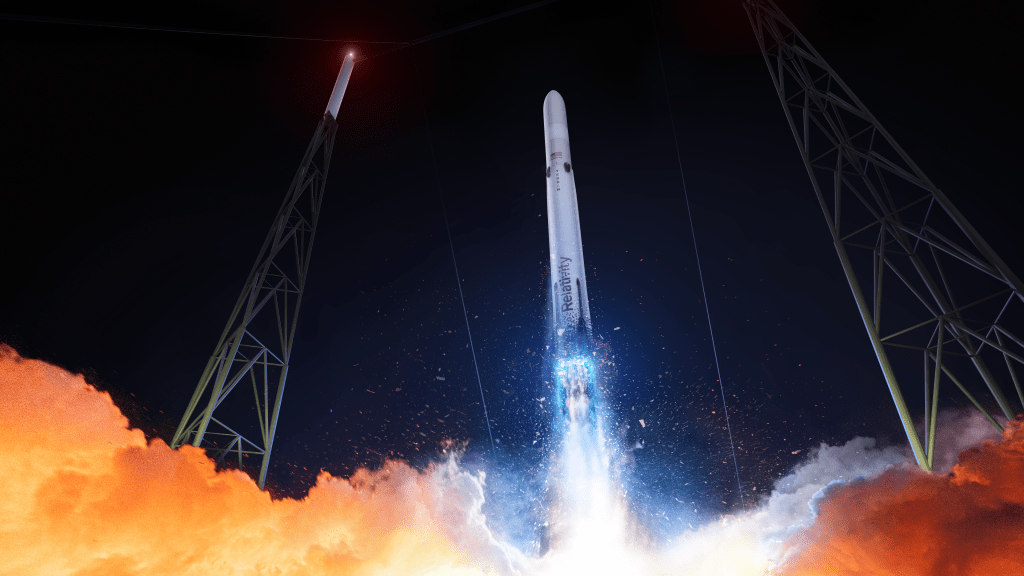Relativity Space CEO Tim Ellis is hitting back against recent comments from fellow aerospace exec Peter Beck, who called launch contracts for un-flown rockets “basically worthless” earlier this month. In sharp contrast, Ellis argued in an exclusive interview with TechCrunch that building a backlog is the only way to validate product-market fit.
“Deciding not to build a backlog is taking a business strategy that has failed pretty epically in history across other products, which is, ‘build it and they will come,’ without actually validating that your pricing and your product capabilities are something that solves the customer problem such that they’re willing to put up material cash up front,” he said.
Eight-year-old Relativity has signed over $1.8 billion across nine customer contracts for its Terran R rocket, which the company expects to start flying in 2026. It’s a substantial backlog, especially when compared to competing launch companies like Beck’s Rocket Lab, which has yet to announce any pre-sales for its Neutron rocket. Beck’s comments about pre-sale contracts being worthless was in response to an analyst’s inquiry during Rocket Lab’s last earnings call on when the company will announce a contract for Neutron, which is expected to make its debut in 2024.
For context, Terran R will have a payload capacity of 23,500 kilograms in a reusable configuration and up to 33,500 kilograms in an expendable configuration, while Neutron will have a payload capacity of 13,000 kg. Both can be seen as a response to shifting market launch dynamics; in particular, the demand for higher payload capacity, high-flight-volume rockets that can serve mega-constellation customers.
Beck offered further comment on such launch contracts: “We can go and sign a launch contract tomorrow with a number of customers, but it will be like, some thousand dollars down and cancellable anytime. But that really doesn’t mean anything.”
But Ellis strongly disputed this characterization, revealing the major divisions in how launch executives think about pre-sales and their go-to-market strategy. The contracts that Relativity signs with customers — which are known as launch services agreements (LSAs) — are a far stretch from something like a memorandum of understanding, Ellis said. (He added that the company stopped doing those many years ago.) LSAs stretch over 60 pages; the ones that Relativity’s customers sign are the bog standard contract used by operational providers, like SpaceX. He added that the sales cycle for each contract is between six-18 months — no small effort — and involves, at least with Relativity, monthly or more meetings between the customer and the company’s engineering teams once the contracts are signed.
“We’ve received material cash up front from those contracts,” Ellis said. “The way that contracts are structured is they’re not cancelable anytime, they actually work such that as long as we develop the product that we say we’re going to develop within a reasonable time period, these contracts are going to be executed.”
Ellis said that signing these LSAs also gives a greater look into a customer’s technical plans and what their requirements are. Relativity was able to see the need for a second launch provider for all the forthcoming telecom constellations — such as OneWeb’s, a company that announced a launch agreement with Relativity in June 2022 — because it was in conversation with prospective customers, Ellis said.
“There was this need and we saw that early,” he said. “Why we were able to see that early is because we were actually talking with customers, and we were actually working to sign launch deals with them.”
This inside information goes both ways: Prospective customers shopping for a rocket can visit companies’ factories, meet teams, see hardware up close, and examine infrastructure, test plans and launch site progress. This diligence matters because the credibility of both the launch provider and the customer is on the line, Ellis stressed.
“Customers get the most transparent view into what state a company is actually at,” he said. “Ultimately, customers only care about you if you actually solve their problem and if they have confidence that this is the best choice.”
Beck said Rocket Lab had to introduce low introductory pricing for its operational rocket, Electron, prior to its commercial debut in 2018. But Ellis said dynamic pricing is “obvious,” and the company’s pricing for Terran R is now 50% higher than it was two years ago.
“Our pricing has escalated [with] every deal we’ve signed. We took a deliberate strategy to offer the very earliest customers some incentives of course, that’s actually been a proven model in the launch industry. We expect every launch company has some introductory pricing, but we’ve been able to escalate pricing to higher than our desired list price, actually, because we see a shifting dynamic between supply and demand.”
By the time Terran R launches its backlog, it will have already collected 90% of the payment for each contract, a common incremental payment schedule across the industry.
In a final refutation of Beck’s comments, Ellis said “to set the record straight” that the company has actually gone head-to-head against Rocket Lab’s Neutron for some of these contracts.
“We have a 100% win rate against the competitors that were in those deals, trying to win them against us, and I can go on the record to say, Rocket Lab was absolutely in some of those deals. So the statement they’re not trying to build a backlog is not true, because we actually won against them several times.”
Regarding Ellis’ comments, a Rocket Lab spokesperson simply said: “We’re engaging many potential customers as we bring Neutron to market, but we’re not interested in signing launch contracts that have minimal financial commitment and loose cancellation terms. Our focus is on building a quality backlog.”































Comment